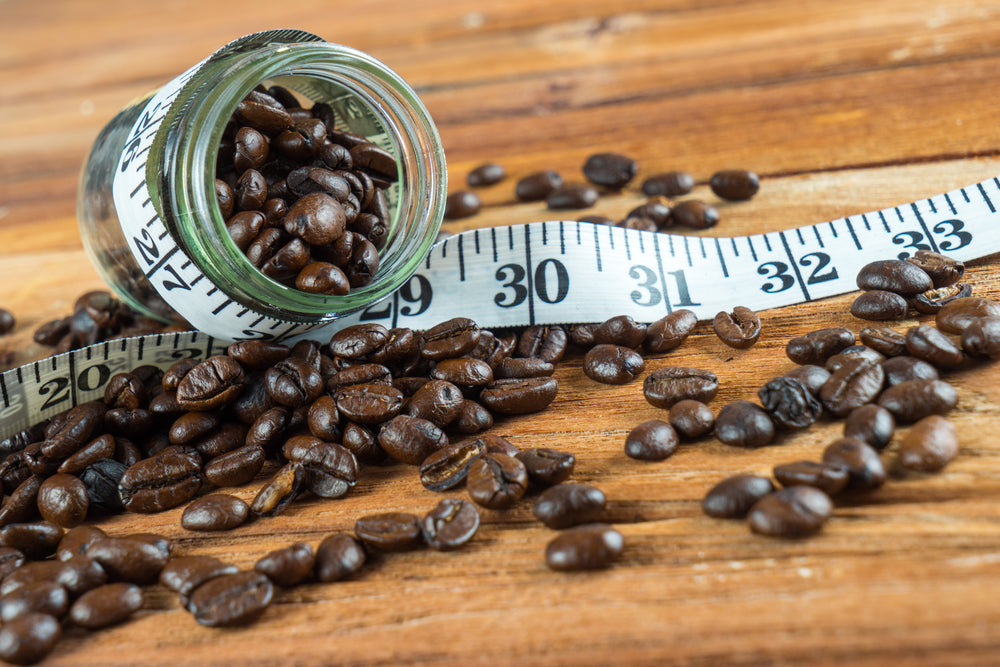Add description, images, menus and links to your mega menu
A column with no settings can be used as a spacer
Link to your collections, sales and even external links
Add up to five columns
Add description, images, menus and links to your mega menu
A column with no settings can be used as a spacer
Link to your collections, sales and even external links
Add up to five columns

Coffee and Weight Loss
November 02, 2023 4 min read
Coffee and Weight Loss: A Comprehensive Review
Introduction
Coffee is a popular beverage enjoyed by millions of people worldwide. It is known for its stimulating effects, rich aroma, and variety of health benefits. In recent years, there has been growing interest in the potential role of coffee in weight loss.
This blog post will provide a comprehensive review of the scientific evidence on coffee and weight loss. We will discuss the composition of coffee, its effects on metabolism, appetite suppression, and energy expenditure, as well as its overall impact on weight loss outcomes.
The Composition of Coffee
Coffee contains a variety of biologically active compounds, including caffeine, chlorogenic acids, and antioxidants. Caffeine is the most well-known compound in coffee and is responsible for its stimulating effects. Chlorogenic acids are a group of compounds that have been shown to have potential health benefits, including anti-inflammatory, antioxidant, and blood sugar-regulating effects. Antioxidants are compounds that can help protect cells from damage caused by free radicals.
Coffee's Effects on Metabolism
One of the main ways that coffee may promote weight loss is by boosting metabolism. Metabolism is the process by which the body converts food into energy. When metabolism is high, the body burns more calories at rest.
Studies have shown that caffeine can increase metabolic rate by up to 11%. This means that caffeine can help the body burn more calories throughout the day, even when not exercising.
Coffee and Appetite Suppression
Another way that coffee may promote weight loss is by suppressing appetite. Caffeine has been shown to have a mild appetite-suppressing effect. This means that coffee can help people feel fuller longer and eat less overall.
One study found that people who drank coffee before a meal ate fewer calories than those who did not drink coffee. Another study found that people who drank coffee regularly had a lower body mass index (BMI) than those who did not drink coffee.
Coffee and Energy Expenditure
Coffee may also promote weight loss by increasing energy expenditure. Energy expenditure is the total number of calories that the body burns in a day. Energy expenditure can be divided into three components: resting metabolic rate (RMR), thermic effect of food (TEF), and non-exercise activity thermogenesis (NEAT).
RMR is the number of calories that the body burns at rest. TEF is the number of calories that the body burns to digest and absorb food. NEAT is the number of calories that the body burns through daily activities, such as walking, fidgeting, and talking.
Studies have shown that caffeine can increase energy expenditure by up to 3%. This means that caffeine can help people burn more calories throughout the day, even when not exercising.
Overall Impact of Coffee on Weight Loss
While coffee may have some weight loss benefits, it is important to note that it is not a magic bullet. Coffee can be helpful as part of a healthy diet and exercise plan, but it is unlikely to lead to significant weight loss on its own.
A review of 23 studies found that coffee was associated with a small but significant reduction in body weight. The average weight loss was about 1.8 pounds over a period of 6 months.
Another review of 11 studies found that coffee was associated with a reduced risk of obesity. People who drank coffee regularly were less likely to be obese than those who did not drink coffee.
It is important to note that the studies on coffee and weight loss have been mostly observational. Observational studies cannot prove cause and effect. More research is needed to confirm the weight loss effects of coffee.
How to Maximize the Weight Loss Benefits of Coffee
If you are trying to lose weight, there are a few things you can do to maximize the weight loss benefits of coffee:
- Choose black coffee or coffee with low-fat milk or unsweetened almond milk. Avoid sugary coffee drinks, such as lattes and frappuccinos.
- Drink coffee in moderation. Too much caffeine can have negative side effects, such as anxiety, insomnia, and headaches.
- Drink coffee before meals to help suppress appetite.
- Combine coffee with a healthy diet and exercise plan.
Conclusion
Coffee is a popular beverage that may have some weight loss benefits. Coffee can help boost metabolism, suppress appetite, and increase energy expenditure. However, it is important to note that coffee is not a magic bullet for weight loss. Coffee should be consumed as part of a healthy diet and exercise plan.
Here are some additional tips for losing weight with coffee:
- Drink coffee before workouts to improve performance and boost fat burning.
- Avoid adding sugar or cream to your coffee, as these can add empty calories.
- If you are sensitive to caffeine, drink decaffeinated coffee or limit your caffeine intake.
- Be sure to get enough sleep and drink plenty of water, as these are also important for weight loss.
**Overall, coffee can be a helpful tool for weight loss
How does drinking coffee improve your workout?
Workout Smoothie Recipes with Coffee
Subscribe
Sign up to get the latest on sales, new releases and more …
